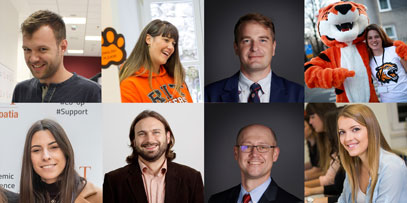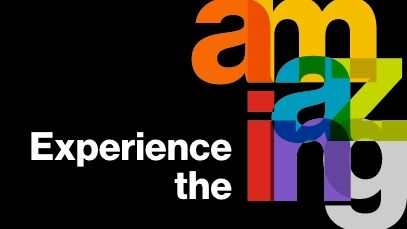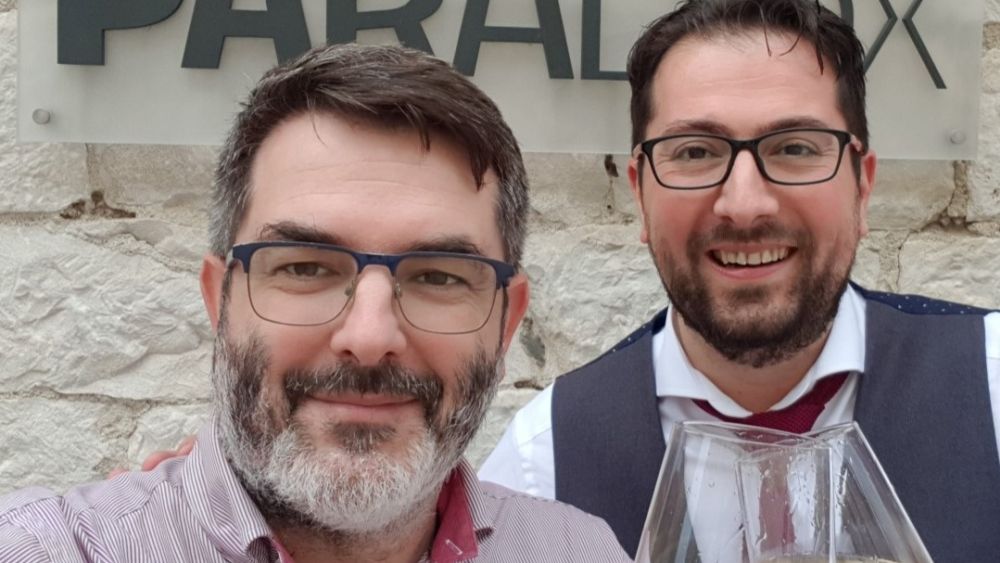The future of tourism and hospitality is emotional - Q&A with Zoran Pejović and Marko Sučić, our alumni who were just awarded with a prestigious Hideaway Report 2019 Editors' Choice Award
The future of tourism and hospitality is emotional
An interesting Q&A with Zoran Pejović and Marko Sučić, our alumni
January 24, 2019
If you ever visited Split, you must have come across, or at least heard of Paradox, a fantastic gastro business concept (and experience ) that has been satisfying foodies since 2012. Behind it all are Zoran Pejović and Marko Sučić, two enthusiasts and alumni of RIT Croatia (at that time it was known as ACMT) who were just awarded with a prestigious Hideaway Report 2019 Editors' Choice Award as one of the best wine and cocktail bars in the world.
Like many other alumni, Zoran and Marko have a special place in RIT 'clique', not just because they are successful, but because they remained close and active members of our alumni community (and they're a great company to be in, btw ).
Anyway, we used this opportunity to chat with them, about Paradox, but education as well. We wanted to know how they see the future of hospitality and how education should respond to those needs....
1. First of all congrats on the Hideaway Report 2019 Editors' Choice Award! Everyone knows about Paradox so it did not come as a surprise, still it is nice to be recognized like that. Which recognition has been the most important to you over the past year?
Marko: We have received numerous accolades over the years, but this one from Hideaway Report has a special significance because it represents a professional recognition from the industry specialists at the highest level. We have been featured over the years in New York Times, Conde Nast Traveller, Lonely Planet Magazine just to name a few, but this one really stands out, it made us feel like we truly belong to the world community of fine hospitality establishments.
2. Let's go back to the beginning - you literally changed the Split's gastronomy scene with your idea. How did the story come to life? What was the most important concept in your business idea then and has it changed over the years?
Marko: We kept it simple. We selected best Croatian products and produce, an amazing selection of local wines and cheeses, and trained our team to deliver service that was as focused on the element of entertainment and enjoyment, which great food and wines ultimately are, as on the segment of education and storytelling. We have done almost everything differently to the way things were done in Split prior to that point. We still keep it simple, that has not changed over the years. The only thing that has changed is the venue. Now, we occupy much bigger space that allows for more flexibility.
Zoran: It might sound like taken from some magazine, or a book but we really try to operate our businesses with the same three basic non-negotiable elements in mind; respecting the past while building a new heritage, bridging the future with seamless technological integration and innovation and delivering exceptional and authentic experiences to the guests in the present. Authenticity refers to the people who deliver the service. Sincere, genuine and free to help guests get the best out of their time when in our care.
3. With regards to education in hospitality - can you go back to your ACMT days? Are there concepts / ideas that shaped how you think today? Anything specific that marked that period of your life and that you still remember? How has RIT shaped you?
Zoran: Everything about those four years played an immense role in our development. Everything about RIT in those years was so novel to us, especially to me, that it represented a genuine cultural shock, a welcome one albeit. There is so many random events that I could pinpoint and say that was it, that changed my perspective on life and business, but it would probably be wrong. It is all those things together, and who knows how many other events that happened and whose importance I have not acknowledged at the time. However, one thing that has remained over the years are the friendships and networks that we created during the college years.
4. Which trends would you emphasize when it comes to the future of hospitality industry? How do you plan to address them?
Zoran: The future of tourism and hospitality is emotional. The future of all business for the foreseeable future is emotional in my opinion. That is the narrative we live in, believing in the intersubjective truth that tells us that in order to make the most out of their human potential, people should travel around the world, experiencing that world, taking in as much as possible. Israeli historian Yuval Noah Harari calls today's travelers "the true believers in the myth of romantic consumerism". The romantic part of it is obvious, as is the consumerist, but I do not consider it to be bad. It makes people be better human beings, increasing their sense of gratitude and generosity which in turns propels their social behavior. So, our part in that equation, as the designers of those experiences, is to make them honest and sincere, and hard to replicate if possible.
5. Talking about education, what would you say is are the key needs or requirements coming from the hospitality market that education should address?
Zoran: Less specialization and more general knowledge about the world. More soft, social skills, communications, listening, empathy but also writing skills, eloquence, etiquette and most of all critical thinking. Hospitality industry is no rocket science, but it is like one tenth of ten different industries that are as difficult as rocket science. We need to be teaching kids more to converse and less to debate. Teaching them that out there are people with different worldviews that might collide with theirs, and that it presents an opportunity and not a threat. Teaching them how not to run at the first sign of difficulty. Teaching them what to do with the chaos of the information they are presented with daily. Teaching them what to do with the chaos of their own thoughts. This is peoples' industry, they need to be equipped to deal with people. Please stop creating safe spaces, we will all end up more divided than ever.
6. Finally, we have a lot of hospitality students and I bet they have some really cool ideas too. What would be your advice to them with regards to developing one's career in the hospitality industry?
Zoran: I will sound a bit old-fashioned here, but ideas have no value without realization. For an idea to become an innovation, a lot of hard work must be put in it. Write down your ideas and start sketching a plan what to do with that idea. Think about the context, about finances, about human resources and most importantly about the communications. How will you tell the world about your idea, how will you tell prospective investors about your plan to deliver on that idea, how will you tell your team why is that idea worth pursuing and so on. Also, think about ideas and innovation not only in terms of products but also in terms of processes and systems. A lot that needs changing and improving in that area. Don't believe that you can be whatever you want to be, that is a very, very stupid idea. But surely there is something that you are uniquely qualified to do, in the intersection of your knowledge, experience, personality traits and background. Look for something that will utilize all those elements to the highest level.
Recommended News
-
November 15, 2024
-
November 5, 2024
-
October 31, 2024
-
October 30, 2024











